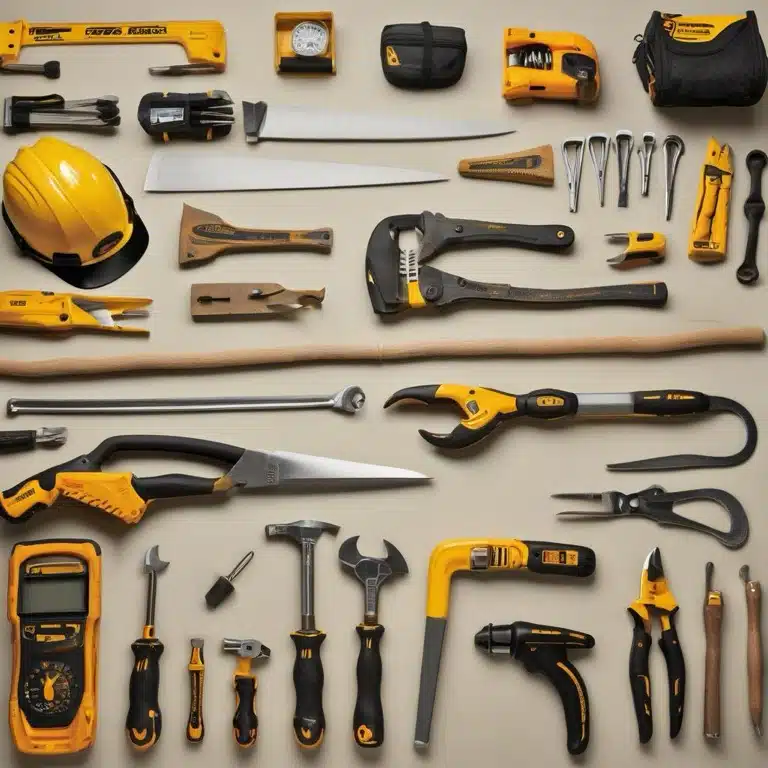Why Tradies Need Insurance for Tools and Themselves
Every tradie knows the hardship of a lost tool; it’s like losing a trusty sidekick.
In the midst of a bustling workday, even the most vigilant can become victims of theft or accidents.
Beyond the tangible loss of equipment, there lies the unspoken threat to livelihood, a sobering reminder of vulnerability in the trade industry.
Table of Contents
ToggleRisks to Your Livelihood
The day-to-day operations of a tradie involve an intricate ballet of manoeuvres that, while performing skilled work, simultaneously exposes them to a plethora of risks. Each tool is not just an instrument but a pillar of your trade’s continuity; damage, theft, or unforeseen situations can introduce a chasm in your workflow and finances. Without adequate insurance, such an interruption can burgeon into a full-fledged crisis, potentially derailing your project timelines and impacting your reputation. This susceptibility extends beyond equipment to the tradie themselves, where personal injury or liability claims can likewise culminate in significant financial strife and occupational jeopardy.
Theft and Damage Pains
Tradies often bear the brunt of gear theft and accidental tool damage—prevalent issues with high stakes and disruptive effects.
The cost to replace stolen or damaged tools can swiftly escalate, imperilling the financial stability of even the most prudent tradie.
Should theft or damage occur, the immediate financial pressure and operational disruption are compounded by the downtime and impacts on service delivery—potentially tarnishing your professional reputation.
Efficient risk management demands both preventive measures and strategic insurance to counterbalance the consequences—protective steps that safeguard your tools and your economic resilience.
Downtime Equals Lost Income
The axiom, “time is money,” aptly encapsulates the direct correlation between operational downtime and financial loss for tradies. This downtime, whether due to tool theft, damage, or personal injury, represents a critical period where no income is generated.
In the trades sector, time lost can never be recovered. One cannot simply ‘make up’ for lost working hours.
Tradies thrive on a continual workflow to maintain financial health. Interruptions to their work, therefore, can be financially crippling.
Consider the cumulative cost of each idle day. The direct loss of income, coupled with the expense of tool replacement or repair, can quickly accumulate.
Clients rely on the punctuality and reliability of trades services. Delays or cancellations corrode trust and can lead to diminished future job opportunities.
Ultimately, the chain reaction from downtime impacts not just the tradie’s present workload but also their long-term business viability. Secure insurance helps mitigate these risks by providing a financial safety net for such occasions.
Legal Liability Protection
As tradies navigate their daily tasks, they encounter various risks that can culminate in legal claims, from accidental property damage to personal injury caused to a third party. Adequate legal liability protection is pivotal, providing both defence and compensation, ensuring that when legal claims arise, tradies are not left in a precarious financial position.
Legal liability insurance acts as a vital safeguard, offering peace of mind. Should a claim emerge, tradies aren’t bogged down with the stress of potential financial ruin stemming from hefty legal costs and settlements.
Covering On-Site Accidents
On-site accidents can be sudden and unforeseeable, putting tradies in jeopardy both physically and financially. Such incidents necessitate swift and unambiguous coverage.
A robust insurance policy ensures immediate medical and financial assistance.
It is crucial that the insurance encompasses a breadth of scenarios, from minor injuries to more grave circumstances which may result in hospitalisation or long-term absence from work. The right policy provides the tradie with the essential support to navigate through such adversities, ensuring that there is minimal disruption to their livelihood and business operations.
Comprehensive insurance protection is paramount for tradies facing on-site accidents, as even a seemingly minor injury can escalate into a significant health issue. With the correct insurance in place, tradies can focus on recovery without the added strain of financial concern. This level of security equates to peace of mind which is invaluable in the hands-on trade industry.
Defence Against Lawsuits
Operating within the trades sector exposes professionals to the hazard of legal actions, stemming from incidents like property damage or personal injury.
- Public Liability Insurance: Protects against claims made for property damage or personal injury caused to third parties.
- Professional Indemnity Insurance: Offers defense if professional advice or services lead to a client’s financial loss.
- Statutory Liability Insurance: Covers fines from unintentional breaches of certain laws, excluding criminal acts.
- Defence Costs: Helps to cover the legal expenses associated with defending a claim.
Having the right insurance transposes the complexity of legal disputes from the tradie to the insurer.
Ensuring a robust defence against lawsuits aligns with the fiduciary responsibilities of a tradie, safeguarding personal and business assets.
Insurance Types Explained
When considering insurance for tradies, it’s paramount to encompass both Tool Insurance – covering the replacement costs of stolen, lost or damaged tools, and Personal Accident and Illness Insurance – providing a safety net in the event of an injury or sickness that leads to temporary or permanent inability to work.
These customised insurance policies are tailored intricately to the trade industry’s unique risks and requirements, assuring a comprehensive safety blanket that is responsive to the unpredictable nature of physical labour-intensive roles.
Tool Insurance Essentials
Protection against unforeseen loss is vital.
In the life of a tradesperson, tools are not merely instruments; they are the lifeline of their livelihood. Thus, the significance of Tool Insurance cannot be overstated. It provides a safety net against the financial repercussions of tool theft, damage, or loss. Without it, the burden to replace these essential items would fall squarely on the shoulders of the tradie.
Insurance for tools guarantees trade continuity.
Securing Tool Insurance is a proactive measure for longevity. It ensures that if tools are compromised – due to theft, natural disasters, or accidental damage – tradies are not financially debilitated. This promotes uninterrupted business operation, even in the face of adversity.
Critical coverage extends beyond basic tool replacement.
A comprehensive Tool Insurance policy addresses contingencies that disrupt normal business, offering replacement or financial compensation for tools and equipment. By the end of the financial year 2023, it’s predicted that insurance policies will evolve to encompass broader coverage, integrating technological advances that cater to modern tools and equipment needs. This includes potential for new risks associated with advanced tools and digital integration.
Choosing Personal Coverage
When assessing personal insurance needs, tradies must weigh risks and financial security.
- Income Protection Insurance: Ensures a steady flow of income during periods of illness or injury.
- Life Insurance: Provides financial security to your family in the event of your untimely passing.
- Trauma Insurance: Delivers a lump sum payment upon diagnosis of a specific illness.
- Total and Permanent Disablement (TPD) Insurance: Offers financial support if you’re no longer able to work in your trade.
Consider the impact of potential loss of income on your financial stability.
Selecting the right personal coverage requires careful reflection on the possible health and life risks associated with your trade.
Long-Term Financial Security
Consideration for future financial stability is a paramount concern for tradies. Without adequate protection, the consequence of loss, be it through theft, damage of tools, or personal incapacity, poses a profound financial threat. Ensuring appropriate insurance coverage translates into a robust safety net that can uphold your financial standing in the face of adversity.
To solidify your financial resilience, it is prudent to secure a comprehensive insurance package, which serves as a bulwark against unforeseen incidents. It acts much like a financial life jacket, designed to keep you afloat during times of turmoil. By accounting for both immediate and long-term risks, traditional and emerging, you affix a layer of security that can weather the storms of your professional journey. Hence, insurance is not a mere expense; it is an investment in ensuring that the fabric of your financial future remains intact.
Safeguarding Your Future
The instruments of your trade — the tools and equipment — are foundational to your livelihood, without which tasks come to a standstill, and income ceases to flow. Insurance for these assets guarantees that they’re replaceable, ensuring business continuity.
Loss of personal health can derail one’s career and income. Therefore, personal insurance is indispensable.
Insurance for tradies envisions a protective barrier, hedging against not just the loss of tools, but also securing your ability to earn. It anticipates myriad contingencies – from incapacitating injuries to liability claims – providing a safety net that enables you to recover without landing in financial disrepair.
Being equipped with the right insurance is akin to building a fortification around your most valuable assets: your tools, your skills, and your health. It is a shield against the unpredictability of the future, an unequivocal commitment to resilience, and a means to guarantee that you can continue to provide and thrive in your chosen profession. Consider it less as an expense and more as a prudent investment in the fabric of your professional lifeblood.
The Cost of Being Uninsured
Uninsured tradies face dire consequences, ranging from substantial financial loss to business interruption and income discontinuity.
When tools are stolen or damaged, the immediate out-of-pocket expenses can be crippling. It’s not just about replacing sophisticated equipment or everyday tools; it’s about the downtime and lost revenue when you cannot execute your work. Without the assurance of insurance, these costs become stark realities you must face independently, possibly jeopardising your livelihood.
Moreover, should you suffer an injury on the job, medical expenses can quickly accumulate. Without appropriate personal insurance, the financial burden from lost wages during recovery might become unmanageable, eroding the financial security you’ve worked so diligently to build.
Finally, the risk of liability should not be underestimated. In the absence of insurance, one misstep could lead to legal repercussions that not only drain your savings but could also tarnish your professional reputation. Protracted legal battles, potentially culminating in hefty compensation payments, underscore the critical need for comprehensive insurance, an indispensable safeguard for both your financial and professional wellbeing.



